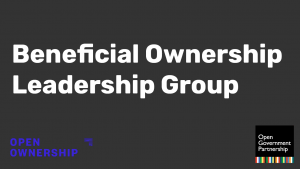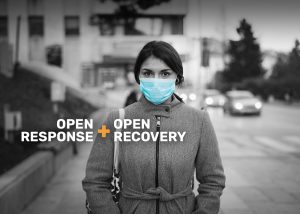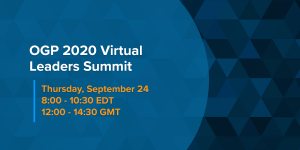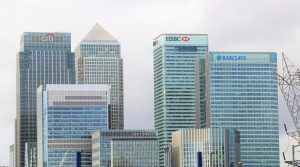FinCENFiles: Why Taking Action Now is Essential to Protect Democracy
FinCENFiles: Por qué tomar medidas ahora es fundamental para proteger la democracia
The COVID-19 pandemic has amplified the need for governments across the world to take urgent policy action on critical issues that protect people’s lives and livelihoods. At the OGP Virtual Leaders Summit last week, world leaders including German Chancellor Angela Merkel and Nigerian President Muhammadu Buhari, civil society champions and development partners including the IMF, World Bank and OECD, unanimously laid out a shared vision for post-pandemic priorities – one that is based on more open dialogue, building public trust, safeguarding fair electoral processes and democratic freedoms, and developing a digital government that is grounded in human rights principles.
Leaks like the Panama and Paradise Papers were shocking in the revelations they uncovered – of the entrenched networks of corruption that seeped through our socio-political and economic lives. Now against the backdrop of the COVID-19 pandemic, files leaked from the Financial Crimes Enforcement Network (FinCEN) take on even greater significance. The leaks throw into sharp relief the vast inadequacies of our current financial and regulatory systems to deliver an economy that works for all, and especially after this unprecedented crisis. The FinCENFiles show how money from violent crimes – drug and human trafficking – is laundered through banks in the absence of any scrutiny from the banks themselves, and absence of any preventive regulatory or oversight mechanisms put in place by governments. Money laundering fuels illicit criminal activities, drains money from public coffers that could fund essential public services like healthcare and educationAccountability within the public education system is key to improving outcomes and attainment, and accountability is nearly impossible without transparent policies and opportunities for participation ..., and exacerbates inequalities. More importantly, as we have discovered recently, it also funnels dark money into disinformation campaigns and destabilizes electoral processes leading to erosion of democratic institutions.
Protecting democracy and restoring citizen trust will remain out of reach if endemic corruption that hollows out these very democratic and governance systems is allowed to continue unabated. Many OGP members like Nigeria and Armenia have begun taking action on this and are working in partnership with local civil society partners and organizations such as OpenOwnership, EITI, TaxPlacing transparency, accountability, and participation at the center of tax policy can ensure that burdens are distributed equitably across society. Technical specifications: Commitments related to c... JusticeTo address barriers that prevent citizens from having their justice needs met, OGP participating governments are working to expand transparency, accountability, and inclusion into all systems of justi... Network to advance beneficial ownershipDisclosing beneficial owners — those who ultimately control or profit from a business — is essential for combating corruption, stemming illicit financial flows, and fighting tax evasion. Technical... More reform. Parliaments now actively partner with OGP several member countries, taking legislative action to deliver landmark lobbyingLobbying transparency allows the public to ensure that there is diversity of participation and contribution to public decision-making. Technical specifications: Policies and actions affecting lobbying... and beneficial ownership reforms. Currently, over 25 OGP members are advancing reform on beneficial ownership, 35 on conflict of interest, and 57 on anti-corruption and oversight institutions. The OGP Independent Reporting Mechanism has designated 56% of anti-corruption commitments as ambitious and over 65% as complete, showing us that while these give us reason for cautious optimism, there is still a long way to go.
As OGP enters its 10th year, it is imperative for the political leadership within the Partnership to show ambitionAccording to OGP’s Articles of Governance, OGP commitments should “stretch government practice beyond its current baseline with respect to key areas of open government.” Ambition captures the po... and take concrete actions on this. There are several things that OGP members could do to show tangible progress:
Promote corporate accountability – The appropriate national authorities in OGP countries should examine the relevant sanctions on banks in the short term, as called for by Transparency International and other civil society partners. Audit institutions should provide relevant and reliable information to act on; Parliaments should ask the right questions and demand not just debates, but decisive action. In the longer term, strengthening these financial accountability systems and oversight institutions at the national level – and sharing of financial data and information across the relevant agencies at the global level – are equally important.
Implement reforms to end anonymous companies – The investigations by BuzzFeed and the International Consortium of Investigative Journalists (ICIJ) show that banks continued to process transactions of several companies even when they were unable to identify the true owners of the companies. It is evident that hidden company ownership remains among the weakest links in the global financial system, contributing to the ineffectiveness of banks to carry out the necessary due diligence.
Illicit financial flows are a transnational problem and therefore beneficial ownership transparency needs to be pursued as a global norm, as countries in OGP’s Beneficial Ownership Leadership Group are advancing. In addition to strengthening national anti-corruption policy, countries need to work with global institutions like the Financial Action Task Force to ensure the necessary global standards remain fit for purpose to address new risks.
Strengthen the overall anti-corruption reform agenda, engage oversight bodies – While creating beneficial ownership registers is important, it is not sufficient to tackle the scale of financial crime. Governments need to protect other systems of oversight to ensure that reporting requirements are not disregarded with impunity, those in power do not benefit from the money siphoned through corruption, owners of these hidden companies do not benefit from public contracts, and those who shed a light on these misdemeanours are adequately protected through strong whistleblower protection laws. Governments cannot deliver on this by themselves: audit institutions, parliaments and citizens must be empowered to play their part in the accountability ecosystem.
Promote cross-sector partnership – While urgent reforms are needed both within the private banking system and by governments, this is not something we can leave to governments and the private sectorGovernments are working to open private sector practices as well — including through beneficial ownership transparency, open contracting, and regulating environmental standards. Technical specificat... More alone. Independent media, like those part of the ICIJ, and civil society play a critical role to ensure that reliable information is shared with citizens in a timely manner, share the necessary expertise to implement these reforms and monitor compliance.
Protect the enabling environment for civil society and the media – Finally, the role played by media and civil society remains conceptual if the enabling environment for them to function freely and effectively is restrained. In the wake of the COVID-19 pandemic, we have seen governments curtail civil liberties and take steps to oppress independent voices that hold them to account. According to OGP’s State of Open Government during COVID-19 analysis, which draws on key indicators tracked by our partners, as of August 2020, 16 OGP countries have restricted freedom of expressionJournalists and activists are critical intermediaries connecting public officials with citizens and serving as government watchdogs, and their rights and safety need to be protected. Technical specifi... More, one in four OGP countries has restricted media freedom, and one in five OGP members has suspended or altered access to informations proceedings in response to the pandemic.
An Open Response + Open Recovery necessitates transparencyAccording to OGP’s Articles of Governance, transparency occurs when “government-held information (including on activities and decisions) is open, comprehensive, timely, freely available to the pub... More of company ownership to ensure money that should be spent on reform and reconstruction is not misappropriated for illicit activities and laundered. Currently over 30 OGP members are co-creating their OGP action plans, which will inform key policy actions that will guide the rebuilding of their socio-economic systems as they recover from the pandemic. We hope to see concerted policy action taken through these action plans. The pandemic has amplified calls to action to create open societies and open economies for all. To do that we need to ensure that public money is utilized efficiently and effectively to benefit all rather than a few and make our systems more resilient to crises.
Featured Photo: Expect Best from Pexels
La pandemia del COVID-19 ha aumentado la necesidad de los gobiernos de todo el mundo de tomar medidas para mejorar la vida y los medios de vida de las personas. La semana pasada, durante la Cumbre Virtual de Líderes de OGP, jefes de Estado incluyendo a la canciller de Alemania Ángela Merkel y el presidente de Nigeria Muhammadu Buhari, líderes de la sociedad civil como Lysa John de CIVICUS y Sayed Ikram de Integrity Watch Afganistán y representantes de organizaciones de desarrollo incluyendo el FMI, el Banco Mundial y la OCDE, de forma unánime, establecieron una visión compartida sobre las prioridades post-pandemia. La visión está basada en un diálogo abierto, construcción de la confianza del público, la protección de los procesos electorales y libertades democráticas y el desarrollo de gobiernos digitales fundamentados en principios de derechos humanos.
Fugas como las de los Panama Papers y los Paradise Papers fueron revelaciones impactantes por lo que descubrieron: redes de corrupción enraizadas en nuestras vidas sociopolíticas y económicas. Hoy, en el contexto de la pandemia del COVID-19, los archivos filtrados de la Red de Control de Delitos Financieros (FinCEN) son aún más graves. Las fugas ponen de manifiesto las grandes deficiencias de nuestros sistemas financieros y regulatorios actuales y su incapacidad de crear sistemas económicos que beneficien a todos, en especial tras esta crisis sin precedentes. Los archivos FinCENFiles demuestran que el dinero generado con delitos violentos – tráfico de drogas y personas – es lavado a través de bancos sin escrutinio por parte de los bancos y sin regulación preventiva o mecanismos de supervisión implementados por los gobiernos. El lavado de dinero fortalece las actividades delictivas, drena recursos de las arcas públicas que podrían fondear servicios públicos básicos como la salud y la educación y exacerba la desigualdad. Lo que es más importante, como descubrimos recientemente, esto también canaliza dinero oscuro hacia campañas de desinformación dirigidas a desestabilizar los procesos electorales, debilitando a las instituciones democráticas.
La protección de la democracia y la reconstrucción de la confianza del público seguirán fuera de nuestro alcance si la corrupción endémica que debilita nuestros sistemas democráticos y de gobernanza sigue presente. Muchos miembros de OGP como Nigeria y Armenia ya empezaron a tomar medidas y están trabajando en colaboración con socios locales como OpenOwnership, EITI y Tax Justice Network para impulsar reformas sobre beneficiarios reales. Los congresos se están asociando con OGP en varios países, tomando medidas legislativas para generar reformas sobre cabildeo y beneficiarios reales. Actualmente, 25 miembros de OGP están impulsando reformas sobre beneficiarios reales, 35 sobre conflictos de interés y 57 sobre anticorrupción e instituciones de supervisión. El Mecanismo de Revisión Independiente de OGP ha calificado al 56 % de los compromisos como ambiciosos y a más del 65 % como completados, demostrando que aunque tenemos razón de ser optimistas con prudencia, aún hay mucho por hacer.
OGP está llegando a su décimo año y, en ese contexto, es indispensable que los líderes políticos de la alianza sean ambiciosos y tomen medidas concretas en este tema. A continuación presentamos algunas medidas que los miembros de OGP pueden tomar para demostrar avances tangibles.
Promover la rendición de cuentas de las corporaciones. Las autoridades nacionales de los países de OGP deben analizar las sanciones a los bancos en el largo plazo, como lo exigieron Transparencia Internacional y otros socios de la sociedad civil. Las instituciones encargadas de las auditorías deben ofrecer información relevante y confiable, los congresos deben plantear las preguntas correctas y exigir no solo debates justos, sino medidas contundentes. En el largo plazo, fortalecer estos sistemas de rendición de cuentas e instituciones de supervisión a nivel nacional – así como el intercambio de datos e información financiera entre las instituciones relevantes a nivel global – son igualmente importantes.
Implementar reformas para dar fin a las empresas anónimas. Las investigaciones publicadas por BuzzFeed y el Consorcio Internacional de Periodistas de Investigación (ICIJ) demuestran que los bancos han seguido procesando transacciones de diversas empresas, aún sin identificar a los verdaderos dueños de las mismas. Es claro que la falta de transparencia en los beneficiarios de las empresas es uno de los eslabones más débiles del sistema financiero global, lo cual ha contribuido a la inefectividad de los bancos para llevar a cabo las diligencias debidas.
Los flujos financieros ilícitos son un problema trasnacional y por lo tanto la transparencia en los beneficiarios reales debe impulsarse como norma a nivel global, como lo están promoviendo los países del Grupo De Líderes sobre Beneficiarios Reales de OGP. Además de fortalecer las políticas nacionales anticorrupción, los países deben trabajar con instituciones globales como la Financial Action Task Force para asegurar que los estándares globales sean adecuados a los nuevos riesgos.
Fortalecer la agenda anticorrupción y colaborar con las instituciones de supervisión. Aunque la creación de registros de beneficiarios reales es importante, no es suficiente para responder a los crímenes financieros. Los gobiernos deben proteger otros sistemas de supervisión para asegurar que los requisitos de reporte sean respetados, que las personas que están en el poder no sean los beneficiarios de dinero corrupto, que los dueños de las empresas ocultas no reciban contratos públicos y que quienes denuncien estas irregularidades estén protegidos por ley. Los gobiernos no pueden atender este problema solos. Las instituciones encargadas de auditorías, congresos y los ciudadanos deben empoderarse para desempeñar su papel en el ecosistema de rendición de cuentas.
Promover alianzas intersectoriales. Aunque es urgente promover reformas en el sistema de bancos privados y en los gobiernos, esto no debe dejarse solamente a los gobiernos y bancos privados. Los medios independientes, como los que forman parte del ICIJ, y la sociedad civil tienen un papel esencial para asegurar que se comparta información confiable a la ciudadanía y que compartan sus conocimientos para implementar estas reformas y dar seguimiento a su cumplimiento.
Proteger el espacio de la sociedad civil y los medios. Finalmente, el papel de los medios y la sociedad civil seguirá siendo teórico si el ambiente en el que operan está restringido. En el contexto de la pandemia del COVID-19, hemos visto que los gobiernos han restringido las libertades cívicas y han oprimido a las voces independientes que les exigen rendir cuentas. Según el análisis de OGP sobre el estado del gobierno abierto durante el COVID-19, el cual se desarrolló a partir de indicadores de nuestros socios, a agosto del 2020, 16 países han restringido la libertad de expresión, uno de cada cuatro países ha restringido la libertad de medios y uno de cada cinco miembros ha suspendido o alterado el acceso a la información en respuesta a la pandemia.
La Respuesta abierta + Recuperación abierta requiere de la transparencia en los beneficiarios reales para asegurar que el dinero que debe asignarse a la reforma y reconstrucción no sea desviado para actividades ilegales. Actualmente, más de 30 miembros de OGP están cocreando sus planes de acción, los cuales diseñarán medidas de políticas para reconstruir los sistemas socioeconómicos como parte de la recuperación de la pandemia. Esperamos que estos planes de acción incluyan medidas coordinadas. La pandemia ha amplificado el llamado a crear sociedades abiertas y economías que beneficien a todos. Para ello, necesitamos asegurar que el dinero público sea utilizado de forma eficiente y efectiva para beneficiar a todos y no solo a unos cuantos, además de lograr que nuestros sistemas sean más resilientes a las crisis.
No comments yet
Related Content

Beneficial Ownership Leadership Group
The Beneficial Ownership Leadership Group came together in 2019 to drive the global policy shift towards free, open beneficial ownership data.

Open Response + Open Recovery
Our community’s fundamental values of accountability, transparency, inclusivity, and responsiveness are vital as we move through COVID-19 response to recovery. Find resources, events and examples from OGP and partners.

Open Government Partnership 2020 Virtual Leaders Summit
Access a full recording of the event and individual speeches made by civil society and government reformers.


Leave a Reply